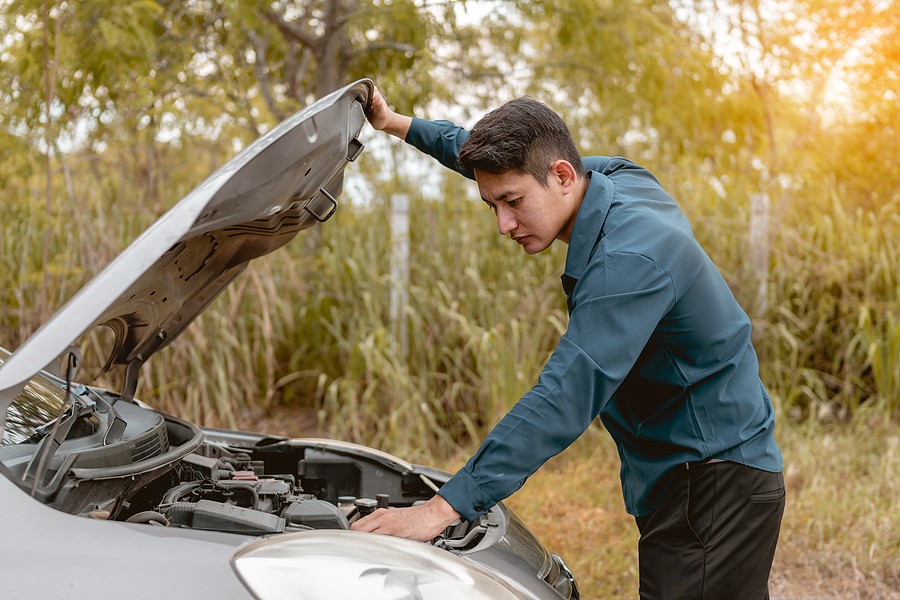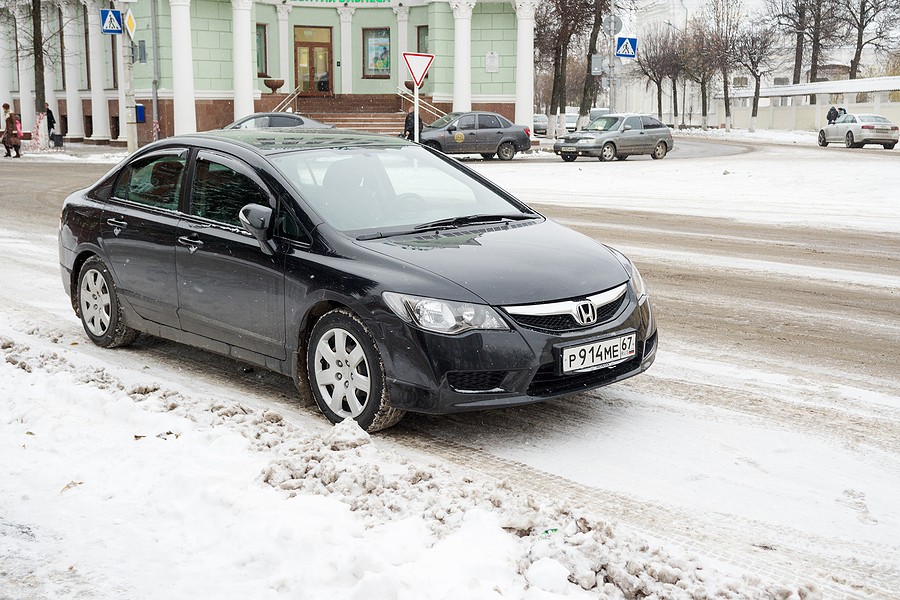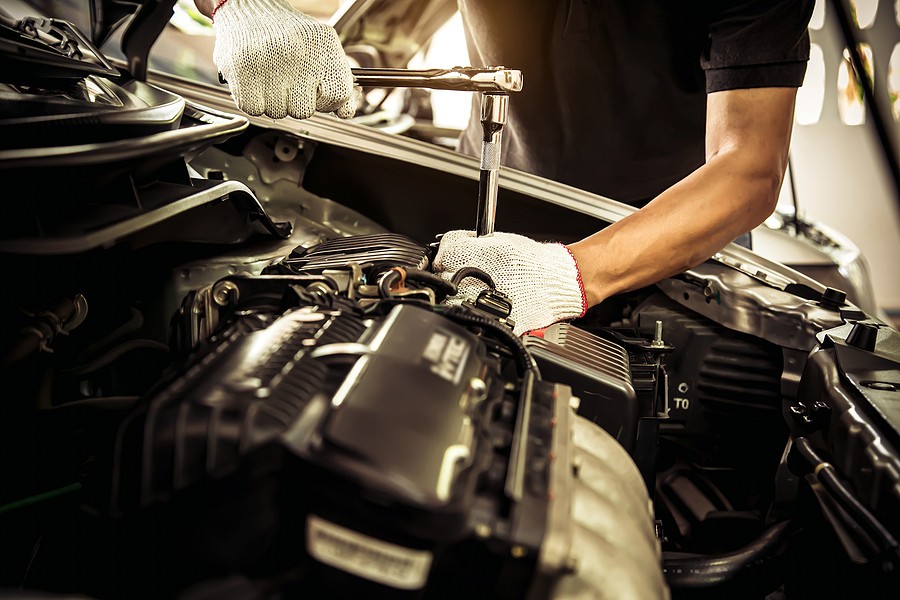The engine is the most important part of any car. Almost every other system in your vehicle relies on an operating engine to work, and if it doesn't do its job, you won't be able to go anywhere. So if you experience any difficulties while driving, a few things should come first on your list of troubleshooting steps. Read on in this article and learn about what to do if you experience engine problems?

How much does engine repair cost?
A common question among car owners is “how much does engine repair cost,” and it's an understandable one. Vehicle owners should know that engine problem might not be as costly as they first appear. If you talk to a mechanic, he should provide a quote for what the repairs might cost.
The price of an engine repair is usually determined by the type of car you have and how old it is. Engines in better condition and newer tend to cost more than older, used engines. If your vehicle is over ten years old and has higher mileage, expect to pay more for an engine replacement.
The engine is incredibly complex, with lots of little parts that all work together to make the whole machine function properly. Therefore, if you experience a problem, it can be difficult to pinpoint where the issue lies. This is why you should have a mechanic look at it if you're not exactly sure what's going on.

The most common engine problems and how to fix them
There are many engine problems that you might face during the lifetime of your vehicle. However, some problems are more common than others.
It is important for you as a driver to familiarize yourself with these problems and get an idea about how to fix them. Understanding the repairs doesn't necessarily mean you'll have to do the job yourself; however, it gets you to understand how much money and effort it will take to repair the engine.
Here are the ten common engine problems and the ways to fix them:
1. The engine shakes and vibrates while idling (shakes at a stoplight, when driving slow, etc.)
Fix: Check the brake pads to ensure enough pads are left for the brake calipers to grab onto. If not, replace them ASAP. Also, check that the front tires are properly aligned and that there isn't anything stuck between the brake pads and rotor or drums.

2. There is a loss of power while driving
Fix: Make sure you turn off any unnecessary electrical equipment installed in your vehicles, such as air conditioning and lights. Also, look at how you drive because sometimes this can cause problems with gas mileage and emissions coming from your exhaust pipe because of bad acceleration or deceleration habits.
3. There is white smoke coming out of your exhaust pipe
Fix: Look under the vehicle for coolant leaks, known to leak white steam. If there's no leak, look at how many miles you drive between oil changes (more than 10k miles can cause problems) and consider getting your oil changed more regularly.
4. The engine misfires while driving
Fix: Make sure that your fuel filter isn't clogged or dirty because this could cause the engine not to get enough gas when it needs it most (during acceleration). Also, check if you have enough air moving through your intake system because sometimes the injectors don't spray enough fuel for some reason, like a bad spark plug or some dirt got in there.
5. The engine won't start
Fix: Check that there is enough fuel in your vehicle because sometimes you can run out of gas or have some problems with the fuel pump or its connections. Also, check for spark because if there isn't any, then either the ignition control module is bad or missing a wire somewhere.

6. There is oil leaking from your engine
Fix: There are two common places where this might happen – directly onto hot parts underneath your car (bypass valve seals) and on the ground underneath where you park it (crankcase ventilator hose). If it's on the ground near your car, check for an oil pressure switch problem, and if there's no mess under your car, then it's probably a problem with the oil pan gasket.
7. The engine is making loud noises
Fix: Check for rust on the exhaust manifold because this can cause some rattling around when the engine warms up, and you hear that noise at all times. Also, check your drive belts because they might be worn out, which will make them noisy.
8. Unusual smells are coming from your engine
Fix: If the smell is like burnt plastic or something else burning, then maybe there's dirt or trash caught between two of your belts (serpentine belt), and it's rubbing against metal parts inside your vehicle, which causes these smells. Also, if there is any gasoline odor inside your car, look under the hood to see if there is any gasoline leaking and if not, it's probably a bad fuel injector.
9. The engine hasn't been feeling quite right when you drive
Fix: Make sure that your transmission fluid level isn't low because when it drops too low, this can cause your car to slip out of gear or fight against the gears trying to get into them, which means there is more pressure on your engine and that can cause some problems with vibration, shifting and eventually failing parts inside your transmission system.
10. Your Check Engine Light is staying on
Fix: Look at the trouble codes stored in the computer (Check Engine Light has a specific number, and you can look up what they mean) and see if they make sense by doing research online or in a shop where they can use a scanner to read the code and hopefully tell you what the problem is.
What to do if you experience engine problems while driving?
If you experienced any of the mentioned engine problems, you need to follow the right procedure to prevent negative consequences that could cost you thousands of dollars.
Follow these steps if you experience engine problems:
1. Pull over to the side of the road if you can do so safely. After stopping, turn off your engine immediately.
2. Check for visible leaks under the hood or around the engine itself. If any fluids are leaking, it may indicate a larger problem with your vehicle.
3. Visually check for any obvious damage to your engine. Look at belts, hoses, and other components around the engine to see if anything has come loose or is damaged somehow.
4. Try restarting your vehicle once you have completed all of the above checks. If it does not start when you turn the key in the ignition, there may be issues with your starter or other parts that are more difficult to detect.

How to prevent engine problems from happening in the first place?
It's not surprising to deal with engine problems at some point; however, you can take some prevention and action items to delay these problems. In other words, experts put together the following list to prevent premature engine damages:
- Schedule routine maintenance visits with your mechanic to keep up on any potential issues and keep your vehicle running smoothly
- Search for signs of problematic leaks before they become much larger and more expensive to fix
- Have a reputable mechanic perform a thorough inspection and diagnosis of any engine problems you experience so that the cause can be pinpointed as quickly as possible.
- Keep up on all of the required maintenance for your vehicle by scheduling timely tune-ups and oil changes with a trusted mechanic to avoid potential problems with key components.
- Use only high-quality parts when repairing or replacing damaged components on your engine to ensure that they function properly and will not cause additional problems down the road.
- Avoid driving when your engine is overheating. If you determine that this has happened, turn off the engine immediately and allow it to cool before starting it again.
- Avoid hard braking or accelerating suddenly when driving. These actions put an incredible amount of strain on your car's components, especially if they are operating under already stressful conditions.
- Take your car for regular test drives to check the performance of all key systems, including braking, shifting gears, and steering. If you notice anything abnormal during your test drive, schedule an appointment with a mechanic immediately so that they can diagnose any potential problems.
- Avoid driving if you hear any strange, loud noises coming from your engine. While these sounds may indicate certain problems that need to be fixed, you should always err on the side of caution. If it sounds abnormal or similar to a metallic screeching noise, pull over and turn off your engine.
- If you encounter any of the problems mentioned in this article, do not hesitate to contact an experienced mechanic as soon as possible so they can help you resolve any issues quickly.
Ways to save on engine repairs
Since engine repairs are very expensive and sometimes unavoidable, one good tip is to know the different ways to save on engine repairs.
Here is a list of 10 tips to save on engine repairs:
1. Make sure you know what the problem is first
2. Check for recalls on your engine- if there are any, follow the instructions and get it fixed for free
3. Always check to see if an engine repair can be postponed- there are some things you can fix at home
4. Always try to price out several different mechanics before you bring your car in for an estimate
5. Make sure you pick a mechanic that is trustworthy and has good reviews/reputation
6. Try not to go with the first quote you receive- even if it feels like they are giving up, shop around and get at least three quotes
7. Know what you are paying for when it comes time to pay up. Make sure they itemize everything, so there aren't any surprises
8. Ask about labor costs- most places charge per hour or flat rate (which means no matter how long it takes, this is the price they'll charge), but some will charge by the job instead of for each part or service
9. Some places will charge you an extra fee if they have to come back to fix something else they noticed when doing the initial repair
10. If you are using a rental car, make sure your mechanic is aware of this or that you are having them work on it while it's in their possession

Common symptoms of engine trouble that you should watch out for
Here are the 10 common symptoms indicating engine problems:
#1 Sluggish acceleration
Suppose your vehicle accelerates slowly or takes much longer than usual to power up. In that case, it could be a sign of issues with the engine's electrical system, which is responsible for sending the right amount of torque to the wheels.
However, sluggish acceleration can also indicate that you are trying to power up too quickly or have even bigger issues. If you can notice any indications of engine trouble when accelerating, try pressing down on the gas pedal harder and increasing your speed more gradually.
#2 Engine vibrations
If your car vibrates at certain speeds, this could be a sign of improper balance in your tires or other components that have been loosened due to frequent exposure to high-stress levels.
Likewise, if you hear rattling coming from the engine, this could mean an issue with your motor mounts. Although these problems are not dangerous to you or the car, they create unnecessary strain on other parts of the vehicle and can cause additional damage in the long run.
#3 Engine misfires
Many modern vehicles run on direct fuel injection systems, which means that combustion occurs directly within each cylinder rather than inside a pre-combustion chamber.
If you notice coming from your motor while accelerating, it might indicate broken piston rings or excessive carbon deposits built up over time. How to fix them? Talk to nearby mechanics immediately or read our article about “how to avoid engine troubles.”
#4 Rough idling
Do take note if there's something off about your idle speed. If it's running faster than usual, you might be dealing with issues like a clogged air filter or dirty fuel injectors that need to be cleaned and replaced.
#5 Low oil pressure
This is the most dangerous symptom of engine trouble as it can seriously damage your vehicle if not addressed quickly! Pay attention if any warning lights appear on your dashboard, and make sure to take quick action by stopping the car and turning off the engine immediately.
Then, try waiting for a few minutes before starting it again and see how things go: if you still experience low oil pressure problems, contact relevant service centers nearby without wasting too much time!
#6 Smell of gasoline
When something goes wrong with your engine, you might smell gasoline as it leaks from the exhaust pipe. As your car starts to overheat, this might also indicate a warped cylinder head and broken piston rings, meaning that an extensive repair process could be required to fix the problem.
#7 Loud knocking sounds
Knocking doesn't always mean that something is wrong with your vehicle: it can happen under certain conditions at high RPMs when the fuel/air mixture combusts irregularly.
Remember, though, that if this noise becomes more frequent or shows up even during idle speeds, there's a big chance there's some engine damage going on that needs serious attention from nearby mechanics!
#8 Smoke coming from your exhaust pipe
Excessive amounts of visible smoke can indicate issues, from a clogged air filter to faulty valves and worn piston rings. Unfortunately, there's no silver bullet that can tell you what exactly is going on with your vehicle, so the best course of action would be to bring it in for a proper check-up!
#9 Losses of engine power
If you notice any loss in power while accelerating or going uphill, this could indicate a problem with the battery or alternator, which cannot provide enough juice for your vehicle. It might also point to issues with the fuel line, which needs cleaning if not replaced entirely.
Finally, if you have trouble getting up things at usual speeds, put the car into neutral and rev the engine: if there's still no progress, might be something wrong with the transmission.
#10 Strange smell inside the car
When driving, make sure to take note if you smell anything weird coming from your car's cabin. For example, if it smells burned or similar to exhaust fumes, this could be a sign of trouble with the catalytic converter, which needs immediate attention to prevent further damage!
Engine Problems FAQs
This section covers the most frequently asked questions about engine problems and what to do when you experience them.
Can engine problems be fixed?
A broken engine is generally unfixable and has to be replaced entirely. However, once you bring your vehicle in for a check-up and repair process, pay attention if mechanics recommend reusing certain parts or replacing them: this can indicate that there are still some untouched areas on the motor which could develop more damage later on!

How much does it cost to replace an engine?
Given the sheer size and complexity of engine parts, this can easily reach several hundreds of dollars. If you're planning to replace your motor yourself, consider purchasing replacement engines from online retailers who offer better rates than physical shops: ensure that you get a warranty for such transactions!
Can I turn off my car to prevent engine damage?
Yes! While doing so might seem like wasting gas, putting your vehicle in neutral and turning off the ignition when it starts overheating is a good way to avoid further damages. Just make sure not to let your car idle for too long without shutting down: if you have no other choice but to leave your vehicle along with the AC or heater on, do put it into Park instead of Neutral.
What is a blown engine?
A ‘blown' engine has broken internal parts which cannot be fixed with the help of replacement engines or other similar methods: if your motor is damaged, then it might as well be considered a broken one!
These situations are usually identified when mechanics have done everything to fix an issue and come up with no results. However, it's still possible to reuse some small components from a blown engine as long as you bring your car in for professional assistance before attempting anything on your own.
Removing stubborn stains from the inside of your vehicle can be quite hard without proper cleaning agents and tools. If you're looking for quality interior cleaners that will do them effectively and quickly, check out our homepage for amazing deals!
Is it worth it to replace an engine in a car?
Yes, it is worth it for the safety of both you and your passengers. But to be honest, since this situation will happen at some point or other, it might as well be now rather than later! In addition, investing in new motor or engine parts should increase safety measures on the road by preventing accidents that could have happened to other drivers around you, not just yours.
Is it cheaper to rebuild an engine or replace it?
While rebuilding an engine can be cheaper than buying a replacement, mechanics tend to recommend using the latter option more because it offers the same results without putting in effort or spending money on extra parts that might not be needed. If you want your vehicle's motor fixed entirely and it's already running fine, go for a replacement instead!
Where can I find cheap car engines?
If you're looking for affordable ways to fix your car's engine, consider checking out available options via classified ads and online retailers: this way, you'll likely find better deals and save time as well! Just make sure you pick a trusted seller who offers warranties with every purchase!
Do people replace their own cars' engines?
This entirely depends on whether or not you know how to fix engines or if you've got the tools needed for such an activity! Attempting to replace your engine, especially if you're new to working on cars, is probably more of a risk than anything else. Some mechanics will recommend finding experts who can do it for you rather than try using DIY kits that might not be safe enough.
When should you get your engine rebuilt?
If you have no clue what's going on with your vehicle's motor, it might be time to check the whole thing out. There are a lot of signs that you should take note of if you want to avoid expensive repairs which could have been avoided in the first place: these include wobbling, shaking, and vibrations.
What is a bad car engine?
From minor to major engine issues, all these concerns are considered ‘bad.' While some problems could be fixed with replacement parts or other resources, others require complete motor replacements to avoid causing accidents on the road. Just make sure you don't wait too long before bringing your vehicle to a trusted technician or specialist: doing so might increase the risk of driving without doing anything about it first.
Can I replace my car's engine myself?
If you already know how engines work and you've got the tools required for such an activity handy, then go for it! However, if you're not sure how to do this or what to look for in engines, don't try anything without assistance from a mechanic who can provide helpful tips and tricks when it comes to replacing car parts.
Remember to keep these tips in mind when changing your car's engine: no one wants to pay more money than they should for something that could have been avoided by taking proper precautions. If you're looking for affordable ways to fix an engine, consider checking out available options online and through classified ads!
What is a car engine?
The car engine, or motor as some might call it, is essentially a machine that stores energy and transforms this power to make the vehicle run. In modern-day cars, you can find four different engines: diesel, petrol/gasoline, semi-diesel, and electric. Each one works differently, but all of them provide the energy needed by your vehicle to function.
Should I sell my car or fix my engine?
It's a tough call. While selling your car can prove to be much easier than replacing its engine, the latter option might cost less in the long run if you don't have enough money at hand. If you're running another motor in your vehicle and it's still working fine, consider using it until you get back on track financially!
How to sell a car with a damaged engine?
If you're looking to sell your car with a damaged engine, one of the best things you could do is look for prospective buyers yourself. Don't trust online ads or classified listings because most of the time, these are used by scammers who want to get their hands on your information and data! Instead, use social media and other tools to find a potential customer and arrange a meeting with them in person.

Do car engines have a warranty?
As long as the engine is still workable, you might get a decent warranty from certain companies or suppliers. However, this solely depends on how willing they are to do something about it: even though most parts for engines will come with warranties, they might not be good enough to cover the issues you're having.
Does CARMAX buy cars with damaged engines?
While they can buy your vehicle with a damaged engine, they would only do so if you have AAA or another similar membership. Make sure you have one of these to get this great deal because otherwise, it might be quite difficult to sell your car with a messed-up motor!
Can I sell a car with a damaged engine on craigslist?
Craigslist is an excellent place to find a buyer for your car with a damaged engine, but it's also the perfect environment for potential scammers and other people who will use you! Unless you know what you're doing or have some form of protection against these sorts of issues, we recommend that you don't sell your car on Craigslist.
How much can I sell a car with a damaged engine for?
The price of your vehicle will depend on many different factors, but it's usual for cars with damaged engines to sell for less than half their original price. So if you have AAA or similar coverage, this might be an excellent way to get some money out of your car while still being able to drive it!
Conclusion
If you're experiencing engine problems, the best thing to do is bring your car in for professional assistance. This might seem like an inconvenience or waste of time and money, but it's the best way to ensure that your vehicle is fixed properly. In some cases, it may be cheaper to rebuild or replace an engine than try to fix it yourself–especially if you don't have the necessary tools or knowledge. Remember: prevention is always better than cure, so avoid putting off bringing your car in for a check-up!



